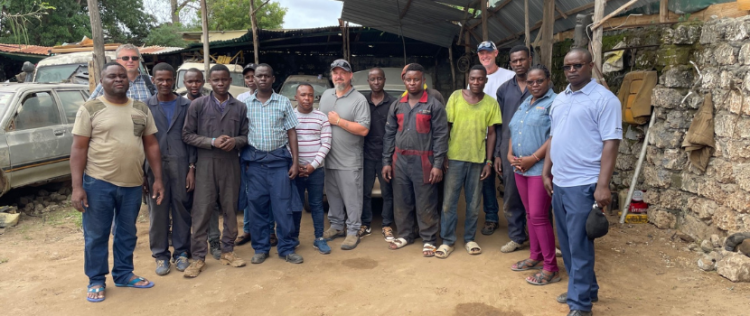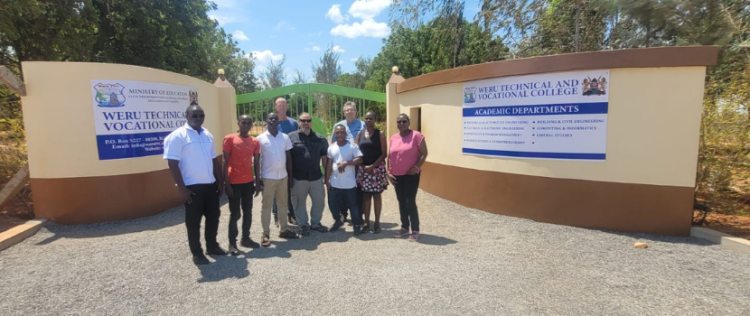
Image Credit: Saskatchewan Polytechnic
Paul Claypool and Gary O'Brien don't often teach welding without welding equipment. As instructors at Saskatchewan Polytechnic's welding and fabrication programs at Saskatoon campus, they more typically use up-to-date equipment and employ hands-on teaching methods a signature of polytechnic education that helps students learn by doing. Recently, the pair got a taste of what training looks like in a very different context as part of the Young Africa Works project in Kenya.
Young Africa Works, which began in 2021 and wraps up in 2024, is a MasterCard Foundation-funded partnership project managed by Colleges and Institutes Canada (CICan) and delivered by Nova Scotia Community College, Vancouver Community College and Saskatchewan Polytechnic. Aimed at increasing the capacity of institutions and agencies responsible for technical and vocational education and training, the project's end goal is qualified graduates with the right skillsets to find employment in the Kenyan economy.
CICan paired Sask Polytech with Weru Vocational Technical College to assist in improving its automotive and welding programs. Over several years, automotive technology and welding instructors from Sask Polytech provided technical training to their Weru counterparts, both online and in Kenya, and the Kenyan instructors visited Sask Polytech. During these visits Sask Polytech faculty made extensive recommendations for equipment purchases necessary to get a new welding program at Weru up and running. The final phases of the multi-year project have focussed on reviewing curriculum, upgrading courses and modules, creating lesson plans and assessment tools, and incorporating a competency-based education and training (CBET) approach to meet local industry requirements.
This past August, Claypool and O'Brien travelled to Maldini in coastal Kenya to put these project results into practice and build upon prior technical training already delivered by Sask Polytech. They had planned to educate Weru instructors and technicians using a train-the-trainer approach on Weru's new welding equipment. Typical of international projects in developing countries, a delay in delivery meant the instructors arrived in Kenya before the equipment.

Image Credit: Saskatchewan Polytechnic
Working with six instructors and technicians from the Kenyan institution, the two instructors spent five days imparting what knowledge they could using the resources they brought and the limited equipment in place at the facility. "We brought textbooks, a few models and parts of equipment stuff we'd have in the classroom for students to touch and feel and shifted our approach to focus on theory," says Claypool.
Weru has a shop built and ready for the new equipment to arrive in October 2024. The MasterCard foundation grant will provide thousands of dollars of equipment for the facility including piping equipment, which O'Brien says the instructors could use to put on specialized courses in manufacturing. "They're going to get a large delivery of new, state-of-the-art equipment," says Claypool, "and at first, they won't know how to use it. They learned technical skills last year with Ron Nickel, our colleague from the welding shop at Saskatoon campus. We gave them the theory they need on this visit and, we hope, the confidence to apply it."
"We did the best we could under the circumstances, essentially taking them through a condensed, level two apprenticeship theory course," says O'Brien. "We spent time with them going through the list of equipment they'll be getting, then searched the items online and got YouTube videos of people operating them to show how each item works. We tried to give them the resources they'll need to learn on their own."
O'Brien told the instructors to use the equipment when it arrives. "It's important that they put into practice what we taught them right away," he says. "The more they become familiar with the equipment once it arrives, the less likely they'll be to forget what they've been learning." Both instructors encouraged the Weru team to reach out to them when it arrives so they can help from a distance. Claypool adds, "We talked a lot about the equipment and reassured them that the more they read about and use the equipment, the better they'll get. We can help troubleshoot over Zoom before they begin using it to teach. We plan to stay connected even now that the project is officially over."
"We were nervous before the trip," says O'Brien, "not knowing what to start with, being unsure about what they'd know. They are great people, though, and very receptive to learning."
Following their classroom days the Sask Polytech instructors and their local counterparts spent some time visiting local welders in the street and seeing the reality of how many of the people in Kenya work. "It was eye opening," says Claypool. "Here in Canada, students often ask how much money it costs to open a welding shop and their thinking is that it's a daunting amount. In Africa it's a broom closet, a dirt floor and no safety equipment. We brought safety glasses and people were so happy to get them. In hindsight I'd have brought a whole suitcase of them."
Reflecting on what travelling as part of an international development partnership has meant for his own learning and career, O'Brien is grateful: "We had to think outside our normal teaching box, figuring out how to guide a group who will be leading their own students in a new area. It was rewarding."
Claypool agrees, adding that the experience also touched him on a personal level. "Some of what we saw in Kenya was really different from our lives here in Canada," he says. "Many people have very little but Kenyan's are hopeful. Having the chance to experience a different way of life and share some of what we know was a very good experience."
To learn more about Saskatchewan Polytechnic's international partnerships and projects, visit: International Development Projects (saskpolytech.ca)













